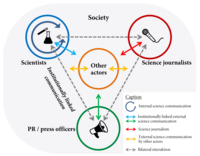
Photo from wikipedia
Objective: To synthesize the evidence on the effectiveness of pain science education on pain, psychological factors and physical functioning in adults who underwent surgery. Data sources: A systematic literature search… Click to show full abstract
Objective: To synthesize the evidence on the effectiveness of pain science education on pain, psychological factors and physical functioning in adults who underwent surgery. Data sources: A systematic literature search of English articles using PubMed/Medline, Embase, Web of Science Core Collection, and Cochrane Library. Review methods: The search strategy was constructed as follows: (((pain) AND (education)) OR (pain education)) AND (surgery). Only controlled quantitative studies in adults reporting outcome(s) on pain, psychological factors and/or physical functioning were included. Risk of bias was assessed using the Cochrane risk of bias tools. P-values and corresponding effect sizes for interaction-effect (time × group) portrayed the difference in change over time between groups were of interest. The last search was conducted on February 28, 2021. Results: Nine papers (n = 1078) were deemed eligible for this review. Two randomized controlled trials showed significant interaction effects. Breast cancer patients who had received one preoperative pain science education session showed a significant increase in postoperative pain compared to controls (P-value = 0.0394). Furthermore, psychological factors (pain catastrophizing and kinesiophobia) decreased in participants who had received pain science education before total knee arthroplasty, while this was not the case in the control group (P-value < 0.001, ƞ2p:0.11). Conclusions: Overall, pain science education did not result in any significant postoperative effects on pain, psychological factors and/or physical functioning compared to controls. There is currently no strong evidence for the implementation of pain science education in the perioperative period. Registration number: PROSPERO: ID 161267, registration number CRD42020161267
Journal Title: Clinical Rehabilitation
Year Published: 2021
Link to full text (if available)
Share on Social Media: Sign Up to like & get
recommendations!